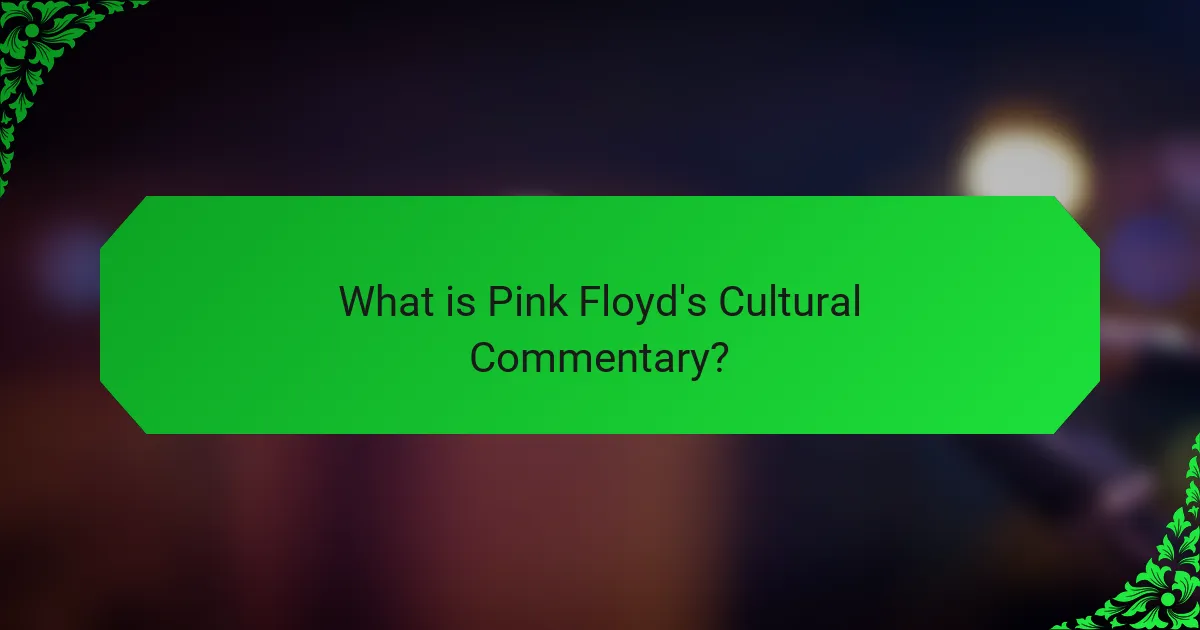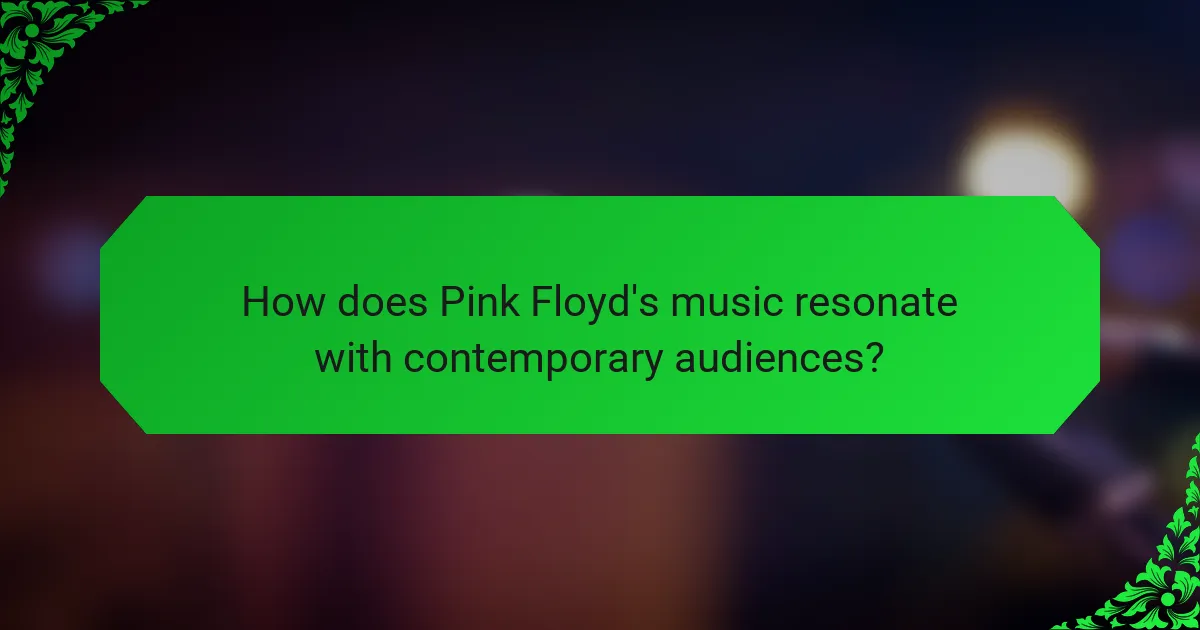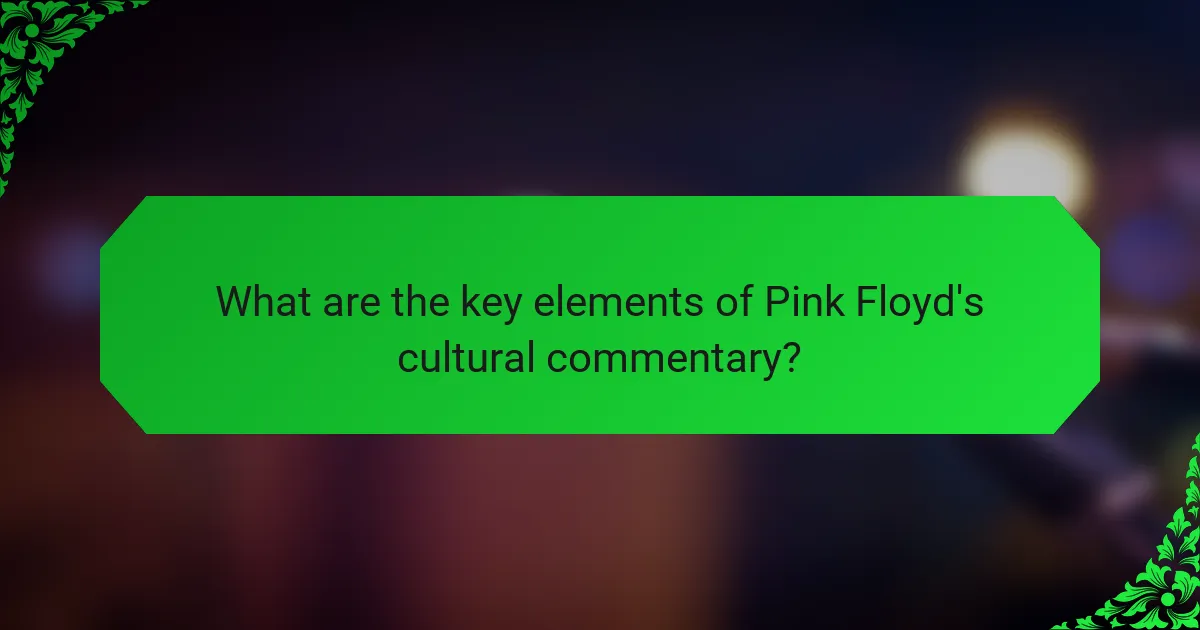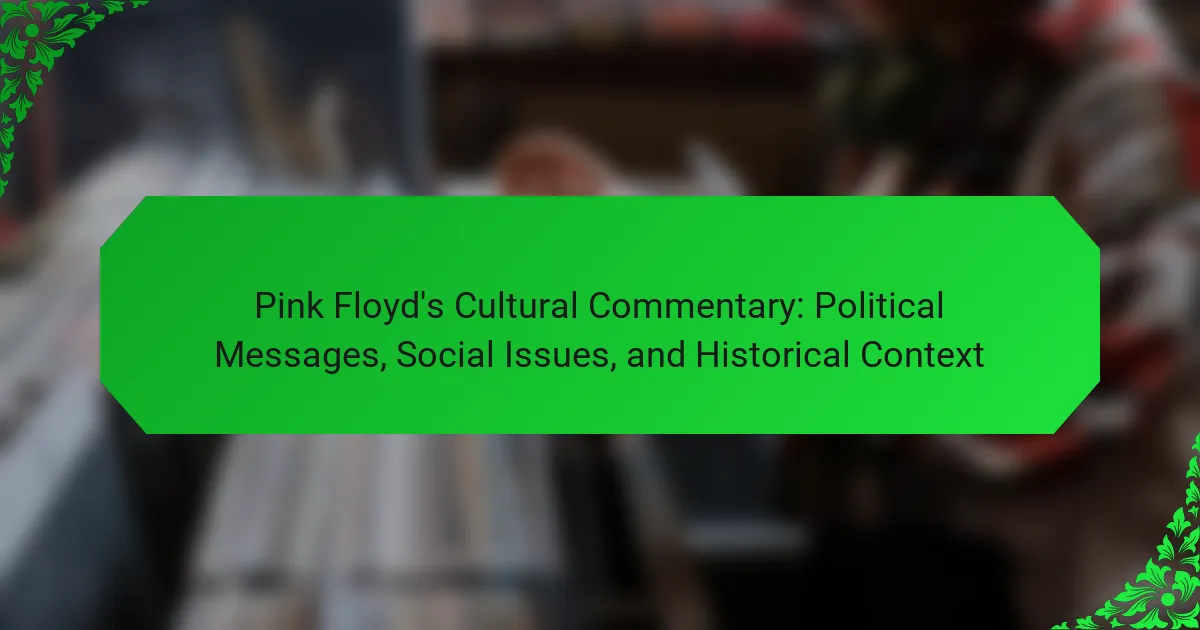Pink Floyd is a prominent rock band known for its cultural commentary that addresses political messages, social issues, and historical context. Their music critiques authority, war, consumerism, and societal alienation, with notable works such as “The Wall,” which explores the psychological effects of war and isolation, and “Animals,” which critiques capitalism and class struggle. Through dystopian imagery and innovative sound, Pink Floyd’s albums resonate with contemporary audiences, reflecting ongoing discussions about social justice and political issues. Their influence remains significant, as their themes of disillusionment and existential angst continue to connect with new generations.

What is Pink Floyd’s Cultural Commentary?
Pink Floyd’s cultural commentary addresses political messages, social issues, and historical context. Their music critiques authority, war, and consumerism. For example, “The Wall” explores themes of isolation and the impact of war on mental health. The band often used dystopian imagery to reflect societal fears. Songs like “Another Brick in the Wall” challenge the education system and its oppressive nature. Their album “Animals” critiques capitalism and class struggle. Pink Floyd’s work resonates with listeners, reflecting broader societal concerns. The band remains influential in discussions about cultural and political issues.
How does Pink Floyd express political messages in their music?
Pink Floyd expresses political messages in their music through lyrics, themes, and album concepts. Their song “Another Brick in the Wall” critiques the education system and authoritarianism. The album “Animals” uses animal symbolism to comment on capitalism and class struggle. “The Wall” explores themes of isolation and societal alienation, reflecting political disillusionment. The band often employs metaphor and allegory to convey their views. Their music addresses war, particularly in “The Final Cut,” which reflects on the impact of conflict. Pink Floyd’s use of soundscapes and theatrical performances enhances their political commentary. Their work resonates with listeners, prompting reflection on societal issues.
What specific songs contain political themes?
“Another Brick in the Wall, Part 2” by Pink Floyd contains political themes about the education system. The song critiques authoritarian teaching methods. It expresses a rebellion against oppressive structures. “Us and Them” addresses themes of conflict and division. It reflects on the absurdity of war and societal divisions. “The Wall” serves as a metaphor for isolation and societal issues. “Money” critiques capitalism and materialism. These songs illustrate Pink Floyd’s engagement with political and social commentary throughout their work.
How do these themes reflect the historical context of their release?
Pink Floyd’s themes reflect the historical context of their release by addressing contemporary political and social issues. Their album “The Wall” emerged during a time of widespread disillusionment in the late 1970s. The themes of alienation and authoritarianism resonated with audiences facing economic struggles and political unrest. The band’s critique of war in “Animals” mirrored the anti-Vietnam War sentiment prevalent in the 1970s. Additionally, their exploration of mental health in “The Dark Side of the Moon” coincided with increasing awareness of psychological issues in society. These themes were not only relevant but also shaped by the cultural landscape of their times. The band’s ability to capture the zeitgeist contributed to their lasting impact.
What social issues does Pink Floyd address in their work?
Pink Floyd addresses several social issues in their work. They critique war, particularly in songs like “Another Brick in the Wall,” which condemns the educational system’s role in perpetuating conformity. Mental health struggles are highlighted in “The Wall,” reflecting isolation and societal pressures. The band also confronts capitalism and consumerism, evident in “Money,” where they explore greed’s impact on society. Additionally, Pink Floyd addresses authoritarianism and political oppression, particularly in “Animals,” which critiques societal hierarchies. Their lyrics often reflect disillusionment with modern life and the human condition, showcasing a deep concern for social justice and individual freedom.
How does the band tackle themes of alienation and mental health?
Pink Floyd addresses themes of alienation and mental health through their music and lyrics. The band often explores feelings of isolation in songs like “Comfortably Numb” and “Wish You Were Here.” These tracks reflect personal struggles and societal disconnection. The lyrics convey deep emotional pain and a sense of longing for connection. Additionally, the album “The Wall” serves as a narrative about mental breakdown and the impact of trauma. The band’s use of soundscapes further enhances the emotional weight of these themes. Their artistic approach has resonated with listeners facing similar issues, making their commentary impactful and relatable.
In what ways do their lyrics critique societal norms?
Pink Floyd’s lyrics critique societal norms through themes of alienation, war, and consumerism. Their song “Another Brick in the Wall” challenges the education system’s conformity. The lyrics highlight the oppressive nature of traditional schooling. In “Money,” they criticize capitalism and materialism’s dehumanizing effects. The phrase “money, it’s a crime” underscores the moral implications of greed. Additionally, “Us and Them” explores the division between social classes and the futility of conflict. These critiques reflect broader societal issues, prompting listeners to question accepted norms. Pink Floyd’s use of metaphor and narrative further amplifies their messages. Their music encourages critical thinking about the world.
What historical events influenced Pink Floyd’s music?
Pink Floyd’s music was influenced by several historical events. The Vietnam War significantly shaped their lyrical themes. The anti-war sentiment resonated in albums like “The Wall.” The counterculture movement of the 1960s also impacted their style and message. The rise of authoritarianism in the UK influenced their critique of government. Events like the 1968 Paris student riots inspired their exploration of social issues. The economic struggles of the 1970s were reflected in their music’s themes of alienation. Pink Floyd’s work often mirrored the societal changes and tensions of their time.
How did the political climate of the 1960s and 1970s shape their sound?
The political climate of the 1960s and 1970s significantly shaped Pink Floyd’s sound. The Vietnam War and civil rights movements influenced their lyrical content. Themes of disillusionment and protest emerged in their music. The band’s early works reflected anti-establishment sentiments. Songs like “Another Brick in the Wall” criticized the educational system. The socio-political unrest of the time fostered a sense of urgency in their compositions. The rise of counterculture also inspired their experimentation with sound and technology. This context created a unique blend of progressive rock and socio-political commentary in their albums.
What role did the Vietnam War play in their lyrical content?
The Vietnam War significantly influenced Pink Floyd’s lyrical content. The conflict inspired themes of alienation, despair, and disillusionment in their music. Songs like “Another Brick in the Wall” reflect the impact of war on youth and education. The lyrics critique authoritarianism and societal control, paralleling the war’s destructiveness. Additionally, the album “The Wall” serves as a metaphor for the emotional barriers created by trauma. The band’s experiences during this era shaped their artistic expression. Pink Floyd’s work captures the zeitgeist of the 1970s, resonating with anti-war sentiments and societal upheaval.

How does Pink Floyd’s music resonate with contemporary audiences?
Pink Floyd’s music resonates with contemporary audiences through its exploration of universal themes such as alienation, war, and mental health. Their albums, particularly “The Dark Side of the Moon” and “The Wall,” address issues that remain relevant today. For instance, “The Wall” critiques the impact of societal pressures and isolation, which many listeners still experience. Additionally, the band’s innovative sound and use of technology appeal to modern listeners. Their music often serves as a backdrop for discussions about social justice and political issues. This relevance is evidenced by ongoing covers and tributes by contemporary artists. Pink Floyd’s ability to evoke emotion and provoke thought ensures their music continues to connect with new generations.
What modern social issues can be linked to Pink Floyd’s themes?
Pink Floyd’s themes can be linked to modern social issues such as mental health, alienation, and authoritarianism. Their music often explores the impact of societal pressures on individual well-being. For instance, the song “Comfortably Numb” addresses the struggles with mental health and emotional detachment. This resonates with current discussions about mental health awareness and the stigma surrounding it. Additionally, themes of alienation in tracks like “Another Brick in the Wall” highlight the effects of oppressive educational systems. This parallels contemporary debates on educational reform and student mental health. Furthermore, Pink Floyd’s critique of authoritarianism, particularly in “The Wall,” reflects ongoing concerns about government overreach and personal freedoms. This is relevant in today’s global context where civil liberties are frequently challenged.
How do their messages remain relevant today?
Pink Floyd’s messages remain relevant today due to their exploration of universal themes such as alienation, war, and societal critique. Their music addresses ongoing issues like mental health and authoritarianism. For instance, “Another Brick in the Wall” critiques the education system, resonating with contemporary debates on educational reform. The band’s anti-war stance in songs like “Us and Them” echoes current discussions on global conflicts. Additionally, their use of powerful imagery and metaphor allows listeners to connect emotionally with their messages. The band’s influence persists in modern music and culture, as artists continue to draw inspiration from their work. Overall, Pink Floyd’s commentary on human experience remains applicable across generations.
Why is Pink Floyd’s commentary important in the music industry?
Pink Floyd’s commentary is important in the music industry because it addresses profound social and political issues. Their lyrics often critique war, capitalism, and mental health. For example, “The Wall” explores themes of alienation and authoritarianism. This album resonated during the socio-political upheavals of the 1970s. Their innovative sound and narrative-driven approach set a precedent for progressive rock. Pink Floyd’s work has influenced countless artists across various genres. Their commentary encourages listeners to reflect critically on societal norms. This impact solidifies their legacy as a pivotal force in music history.
What impact has their work had on other artists and genres?
Pink Floyd’s work has significantly influenced numerous artists and genres. Their innovative use of sound and concept albums redefined rock music. The band inspired progressive rock, with their elaborate compositions and thematic depth. Artists like Radiohead and Muse cite Pink Floyd as a major influence on their music. The incorporation of social and political commentary in their lyrics set a precedent for future musicians. Genres such as electronic and ambient music have also drawn from Pink Floyd’s experimental soundscapes. Their album “The Dark Side of the Moon” remains a benchmark for artistic ambition in music. This impact is evident in the way contemporary artists approach album creation and thematic storytelling.

What are the key elements of Pink Floyd’s cultural commentary?
Pink Floyd’s cultural commentary includes critiques of war, capitalism, and societal alienation. Their album “The Wall” explores the psychological impact of war and personal trauma. “Animals” critiques capitalism by comparing societal classes to animals. The song “Another Brick in the Wall” addresses the oppressive nature of the education system. Their use of dystopian imagery reflects concerns about totalitarianism. The band often incorporated historical context, such as references to the Vietnam War. Their music resonates with themes of disillusionment and existential angst. These elements combine to create a powerful commentary on contemporary society.
How do musical styles contribute to their political messages?
Musical styles significantly enhance political messages by shaping the emotional and cognitive responses of listeners. Different genres evoke distinct feelings and can influence public perception. For instance, punk rock’s aggressive sound often conveys rebellion and discontent. This style’s raw energy aligns with anti-establishment sentiments. Similarly, folk music frequently addresses social issues, using storytelling to connect with audiences. The acoustic simplicity of folk allows for poignant lyrics that resonate deeply. Historical examples include Bob Dylan’s protest songs during the civil rights movement. His folk style amplified messages of social justice. Additionally, hip-hop serves as a platform for marginalized voices, addressing systemic issues. The rhythmic and lyrical complexity engages listeners while delivering powerful critiques. Thus, musical styles not only convey political messages but also enhance their impact through emotional resonance and cultural context.
What instruments and techniques are used to convey emotion?
Instruments and techniques used to convey emotion include musical instruments, vocal techniques, and production methods. Pink Floyd often utilized the guitar, keyboard, and drums to evoke feelings. The electric guitar, particularly, creates powerful solos that resonate with listeners. Vocals express emotion through tone, dynamics, and phrasing. Production techniques, such as reverb and delay, enhance the emotional impact of sound. The use of synthesizers adds layers of texture, creating an atmospheric quality. These elements collectively contribute to the band’s ability to communicate complex emotions in their music.
What lessons can be learned from Pink Floyd’s approach to social issues?
Pink Floyd’s approach to social issues emphasizes the importance of critical awareness and artistic expression. The band used their music to address themes like alienation, war, and societal control. Their album “The Wall” illustrates the impact of isolation and mental health on individuals. The song “Another Brick in the Wall” critiques the educational system’s role in suppressing creativity. Pink Floyd’s work encourages listeners to question authority and societal norms. Their use of visuals in live performances amplifies their messages, making them more impactful. The band’s legacy shows how art can provoke thought and inspire change.
How can artists today draw inspiration from their work?
Artists today can draw inspiration from their work by reflecting on their personal experiences and societal issues. Many artists analyze their emotions and thoughts to create meaningful pieces. They often explore themes of identity, conflict, and resilience. Historical events can also serve as a backdrop for artistic expression. For instance, artists might reference political movements or social changes in their work. Engaging with current events can provide a rich source of inspiration. Additionally, artists can look to other art forms for ideas, such as music, literature, or film. Collaborating with other creatives can also spark new concepts. This multifaceted approach allows artists to create work that resonates with audiences and reflects contemporary culture.
What practical insights can be gained from analyzing Pink Floyd’s commentary?
Analyzing Pink Floyd’s commentary reveals insights into societal and political issues. Their lyrics often reflect criticism of authoritarianism and war. For instance, “Another Brick in the Wall” critiques the education system and conformity. The band addresses mental health in “Comfortably Numb,” highlighting personal and societal alienation. Historical context, such as the Cold War, influences their themes of fear and control. Pink Floyd’s work encourages critical thinking about power structures. Their commentary remains relevant today, resonating with ongoing social struggles. This analysis helps understand the impact of music on cultural discourse.
Pink Floyd is the primary entity in this article, which explores the band’s cultural commentary through political messages, social issues, and historical context. The article examines how Pink Floyd’s music critiques authority, war, capitalism, and societal norms, particularly through albums like “The Wall” and “Animals.” It highlights specific songs that address themes of alienation, mental health, and the impact of historical events such as the Vietnam War. The discussion emphasizes the relevance of Pink Floyd’s messages in contemporary society and their influence on other artists and genres.
